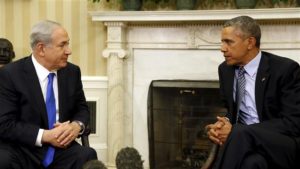Special to WorldTribune.com
by Dr. Jack Caravelli, Geostrategy-Direct
U.S. and Israeli officials are nearing completion of protracted negotiations over a planned decade-long deal for U.S. military assistance, despite deep bilateral political discord stemming mainly from nearly unbridled enmity between President Barack Obama and Prime Minister Benjamin Netanyahu.

The scope and nature of this assistance is described as unprecedented according to insiders. Nonetheless, behind the scenes of what is being portrayed as proof of U.S. commitment to Israel by U.S. officials, there are emerging signs that the deal could turn into a poison chalice for Israel.
The Obama administration is attaching several important strings to its planned support.
Unlike past bilateral assistance packages, for example, the U.S. is insisting that in the future Israel refrain from going directly to the usually highly supportive U.S. Congress should Israeli officials see the need arise for additional funds.
Bypassing the U.S. executive branch in favor of direct outreach to Congress on political and military issues has been a favored Israeli tactic for decades.
Perhaps even more important is U.S. insistence that Israel no longer spend as much as 26 percent of U.S. financial assistance on Israeli companies to carry out research and development (R&D) activities.
An agreement brokered by Israel with the Reagan administration in the 1980s was designed to enable those companies to ensure Israel’s qualitative edge against any prospective hostile nation by carrying out research activities directed by the Israeli government and free of U.S. interference.
Under the likely new arrangements, Israel will be expected to direct those funds to U.S. corporations. Without an approved way to carry out independent R&D under the forthcoming assistance package, Israel’s ability to maintain its R&D infrastructure will be compromised.
For decades the United States has been Israel’s most important provider of offensive and defensive weapons, including the Iran Dome missile defense system.
Underpinning that relationship has been the commitment from U.S. presidents from both political parties that Israel would always maintain a qualitative military advantage over any possible regional adversary.
Israeli officials are reporting the current $3.1 billion annual defense cooperation agreement, which is set to expire in 2018, will be replaced by one valued at nearly $5 billion annually.
The funding increase, in Israeli eyes, is justified by the imperative of keeping pace with Iran.
The theocratic regime is receiving as part of the nuclear deal billions of dollars in previously frozen assets which could be used in part to modernize the Iranian military and expanding support for terrorist operations across the region.
Political considerations, never far from the surface in the bilateral relationship, also are coming into play. Israeli officials recognize that completing the deal under its current terms is far from ideal but have expressed quiet concern that the U.S. presidential election could produce a winner unable or unwilling to match the funding level being negotiated with the Obama administration.
For the administration, completion of the deal before it leaves office would be portrayed as a final example of the president’s unstinting support to Israel, further cementing a legacy — at least in the eyes of his supporters — that demonstrates Washington has not tilted toward Teheran.
